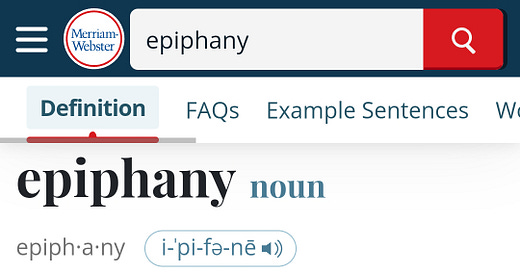Hi there! How was your weekend?
I hope it was filled with relaxation, love, and creativity. Venus entered Pisces on January 2nd, infusing the first weekend of 2025 with its magical qualities.
Mercury also finished its post-retrograde shadow. Hurray!
Communications will become smoother starting this week. But don’t forget that Mars is still retrograde, so if you feel like dragging your feet, that’s completely normal. Hang in there.
Today is a significant day in the Spanish-speaking astrology communities.
Why, you may ask?
In the Western Catholic faith, the celebration on January 6th is the Feast of the Epiphany. This day is also known as Three Kings' Day.
It marks the revelation of Jesus Christ as the Son of God to the Gentiles. The Gentiles were those who were not Jewish. This was symbolized by the visit of the Magi (the Three Wise Men) to baby Jesus in Bethlehem.
In some Catholic Spanish-speaking countries, this is the Day of the Astrologer. It honors the Magi, who were astronomers and astrologers themselves.
This date has a lot to unpack, so bear with me.
Epiphany and the Bible
“Magus” was the denomination that a wise priest received among the ancient Medes and Persians. “Magi” is its plural form.
This term was not associated with illusionism or doing tricks with cards. Instead, the Magi were capable of interpreting the movements of the stars. By doing it, they were closer to God.
The story of the Magi or the Three Wise Men is recounted in the Gospel of Matthew. They arrive in Jerusalem from the East. Allegedly, they came from an area towards the East of the Jordan River and the Dead Sea.
When the Three Wise Men arrive in Jerusalem, they ask for the newborn king of the Jews. They wanted to pay homage to this new king. What guided them from the East to Jerusalem was a moving star.
Herod I or Herod the Great, the king at the moment, felt threatened by the birth of a potential contender. So he gathered all the chief priests and scribes of the people. Then, he asked them where the "Anointed One," also known as the Messiah, was to be born.
They answered the place was Bethlehem. This interpretation came from a prophecy in the Book of Micah (5:2). The book is part of the Old Testament for Catholics.
With this information, Herod instructed the Three Wise Men to go to Bethlehem. After they had found the baby, they needed to report back to him. Herod wanted to worship the new king, too.
Of course, this was a lie. Herod wanted to destroy the newborn because this birth could jeopardize Herod’s power.
The Three Wise Men took off to Bethlehem. They were guided by the same star that directed them to Jerusalem from the East. At one moment of the trip, the star stopped moving. It was a signal. Baby Jesus was there.
The Magi arrived at the manger in Bethlehem bearing gifts. The gifts they gave to Jesus were gold, frankincense, and myrrh.
There are many different interpretations about the meaning or value of those gifts. Some scholars argue that they were common gifts at the time given to kings. Others believe that they were more medicinal rather than a tribute.
One of the most common interpretations of the gifts the Magi gave to Jesus is that they had spiritual meaning. Gold symbolized kingship on earth, frankincense was a symbol of deity, and myrrh (as an embalming oil) was a symbol of death.
In Catholic Spanish-speaking countries, children leave their shoes out on the night of January 5th. These shoes will be filled on the morning of the 6th with gifts, symbolizing the Magi's offerings. Kids also leave water and grass to feed the Magi’s camels.
The Magi didn’t know Herod’s true intentions. At least, not consciously. In dreams, they received a warning. This warning emphasized that they should NOT RETURN to Herod’s palace. They took this omen seriously and went back home taking a different road.
Joseph, Mary’s husband and (possibly) Jesus’ biological father, also had a prophetic dream. In it, he was warned that Herod intended to kill Jesus. So, he, Mary, and Jesus fled to Egypt.
When Herod realized he had been outwitted, he was furious. He gave orders to kill all boys of the age of two and under in Bethlehem and its closest towns. Herod wanted to keep his power at all costs.
Joseph, Mary, and Jesus stayed in Egypt until Herod's death. Then, they moved to Nazareth in Galilee to avoid living under Herod's son Archelaus.
Many of Jesus' miracles occurred, according to the New Testament, on the shores of the Sea of Galilee. Some of these miracles include his walking on water, and feeding five thousand people.
Jesus eventually returned to Jerusalem. According to the four canonical Gospels, he entered the city on a donkey. A large crowd was following him due to his fame in Galilee.
This triumphal entry into Jerusalem occurred a few days before his crucifixion.
If you’re interested in this topic, you can read more here:
Epiphany and different dates
The Feast of the Holy Innocents is celebrated in Western Christian Churches on December 28th. This event remembers the Massacre (or Slaughter) of the Innocents ordered by Herod, as recounted in the Gospel of Matthew.
If you are confused about the dates, you are not alone.
According to the Gospel of Matthew, the massacre occurred after the Three Wise Men's visit to Bethlehem.
So, in chronological order, it should have been announced one or two days after January 6th.
The Gospel of Matthew doesn’t claim that the Magi visited Jesus precisely on January 6th.
Back then, the Gregorian calendar that we use today didn’t exist.
Different dates and different versions of the same story are standard when dealing with Biblical studies.
The Gospel of Matthew doesn’t explicitly state that the Magi were astronomers or astrologers. It doesn’t say that there are three of them. It does not mention that they are kings or where they come from. There is no reference to their ethnicity or the names Caspar, Melchior, and Balthazar. Camels are not mentioned either.
All of this information emerged, so to speak, later on.
📣 Announcing The Astrology of 2025
I interrupt the newsletter to invite you to The Astrology of 2025, an online workshop I’ll host on Thursday the 23rd of January.
You’ll leave this workshop with:
• Information about the most noteworthy astrological transits of this year
• A thermometer about the hottest months (astrologically speaking) and what you can expect from each of them
• Knowledge of the Rising signs who would have the most hectic year
• Journaling exercises to connect with the stars
• Answers to your personal astral questions
Interested? Here are some details about the event:
When: Thursday, January 23rd, 2025
Time: 6-8 pm London time (1-3 pm EST)
Where: Online in Google Meet
Tickets: Only £15 (around 18 USD)
Bring your journal and a nice pen!
Get your spot now: https://shorturl.at/BoTWT
I’ll see you there!
Now, let’s resume the newsletter.
Epiphany and the dictionary
If you look at the word “epiphany” in the Merriam-Webster dictionary, this is the first meaning you’ll find:
capitalized : January 6 observed as a church festival in commemoration of the coming of the Magi as the first manifestation of Christ to the Gentiles or in the Eastern Church in commemoration of the baptism of Christ
The first part refers to the story we can read in the Gospel of Matthew. The second part refers to the baptism of Jesus (also called Epiphany) in the Jordan River.
According to the Gospel of Luke, Jesus was around 30 years old when he was baptized in the Jordan River. Is it safe to say that he was going through his first Saturn return when this happened? No. But I would like to think it’s true.
Then, if you go to the second meaning of “epiphany” in the Merriam-Webster dictionary, you’ll find this:
an appearance or manifestation especially of a divine being
The second meaning is directly connected with the first one for Western and Eastern Christians. Western Christianity believes that Jesus was revealed as a divine being when he was a baby. Eastern Christianity holds that this revelation occurred when he was baptized at 30.
No matter what you choose, that’s epiphany.
Epiphany and astrology
The astrologer Boris Cristoff suggested that the Day of the Astrologer should be celebrated on January 6th. This date honors the Three Wise Men.
Boris Cristoff was born in 1925 in Sofia, Bulgaria. His paternal grandfather was an Orthodox Christian priest. This may have influenced the choice of January 6th as the Day of the Astrologer. Cristoff moved with his family to Uruguay when he was 5 years old.
When he suggested January 6th as the date to celebrate the Day of the Astrologer, the idea was well-received by astrological schools in Spanish-speaking countries. These countries are mostly Catholic, at least traditionally.
The English-speaking world celebrates International Astrology Day on the Spring Equinox in the Northern Hemisphere.
I celebrate on both dates.
So, happy Day of the Astrologer to me, to you, and everyone engaging in this fantastic discipline!
Hope you enjoyed this text and until next Monday,
Valentina
P.S.: Get your ticket for the workshop!






